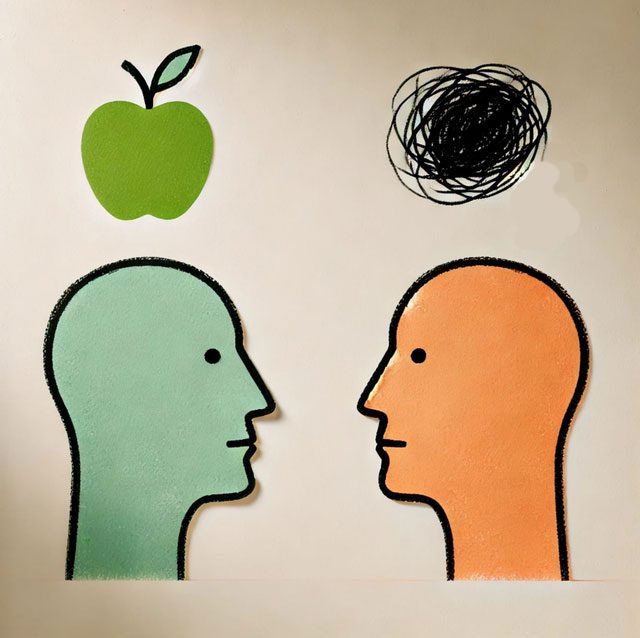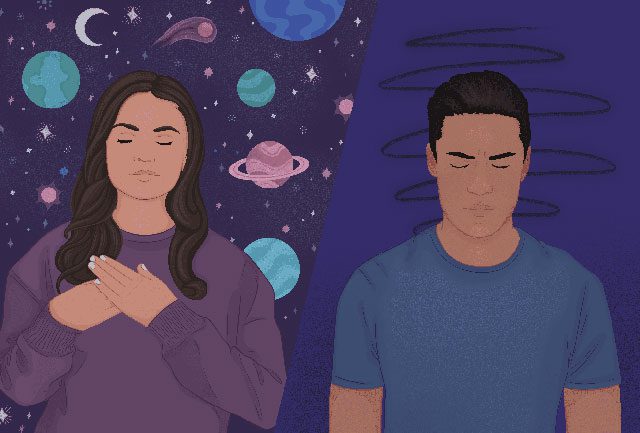What if you couldn’t imagine? What would life be like for someone with Aphantasia? Can they dream? Can they remember their ex-lovers?
“Tell someone not to think of a pink elephant, and that person will never be able to forget the creature.” This quote is taken from the novel “City on the Sky” by German author Curt Siodmak, written in 1974.
Since then, this example has become a classic test for doctors, used on patients suspected of having a peculiar condition known as “Aphantasia”, which roughly translates to the inability to visualize.

Aphantasia derives from the Greek word “phantasia“, meaning “imagination”. Adding the prefix “a”, it means “without imagination”.
As its name suggests, those with Aphantasia cannot visualize any images in their minds, whether it be a pink elephant, a memory they experienced, the face of a loved one, their mother, spouse, or even their own reflection in the mirror.
Thus, a normal person asked not to think of a pink elephant would likely visualize one, due to the “Romeo and Juliet effect” – the phenomenon that forbidding something only makes you think about it more.
The reason is that when you’re told not to think about something, your mind becomes overly alert to it, inadvertently causing you to think about it more.
Psychological experiments show that when asked to think about a pink elephant, on average, your brain will visualize the image once every minute afterward. Five minutes later, the frequency can even double.

Ironically, those asked not to think about the pink elephant end up visualizing it twice as much as those who are told to think about it.
However, this is true for normal individuals. For those with Aphantasia, they simply cannot visualize the pink elephant at all.
But why is that?
Aphantasia has been mentioned in medical literature since the 19th century, first described in a scientific article in the journal Mind in 1880, but it was forgotten and not mentioned for over a century.
It wasn’t until 2005 that a group of scientists led by Professor Adam Zeman, a neurologist from the University of Exeter, revisited this phenomenon after accidentally discovering a patient who could not visualize images.
Professor Zeman is also the one who coined the term Aphantasia. Since then, research on this syndrome has progressed, gradually unveiling the mystery surrounding one of the strangest syndromes on Earth, the lives of patients who cannot visualize images, and the causes of the condition.

Approximately 0.8% of the population currently suffers from complete Aphantasia.
According to a study published in the journal Consciousness and Cognition, about 0.8% of the population experiences complete Aphantasia, while 3.9% have a milder form, meaning they can still visualize images in their minds, but only as vague, indistinct representations.
The cause is believed to stem from the inability of the brains of those with Aphantasia to convert visual information, including the shapes, colors, and depth of objects they see into mental images.
They can still see everything like normal people, but cannot remember them visually. Instead, other characteristics of objects, such as sounds, tastes, and feelings, are recalled to help those with Aphantasia remember the objects.
Scientists still do not know exactly what mechanism in the brain causes this phenomenon, which they refer to as “a glitch in the systematic processes of various stages.” Some people have had Aphantasia from birth, while others may experience it after a brain injury, stroke, or as a side effect of certain medications.
What would life be like for someone who cannot visualize?
To find out, let’s ask them directly, the patients with Aphantasia. Niel Kenmuir, a 48-year-old man living in England, has had this condition since birth.

Kenmuir reported that he began to notice his condition as a child. His stepfather had asked him to imagine sheep jumping over a fence and count them to fall asleep. But he couldn’t.
“I can’t see any sheep jumping over the fence. There’s nothing to count“, Kenmuir said.
Sharing a similar experience, a woman named Serena Puang also recounted: “In elementary school, I sometimes had trouble sleeping, and people told me to count sheep. Although I had seen sheep jumping over a fence in cartoons, when I tried to imagine it, I never saw anything – just black. I quietly counted in the dark for many years.“
While Aphantasia might make counting sheep difficult, it doesn’t seem to significantly impact the creativity or imagination of those affected. Most individuals with Aphantasia live normal lives and often do not realize their differences from others.
For example, Kenmuir works in a bookstore and can remember where books are placed on the shelves without needing to visualize images of them.
Can’t visualize his wife’s face
One question many might wonder is how Kenmuir lives with his wife if he can’t visualize her face.
“That’s the hardest thing to describe, what goes on in my head when I think about things. When I think about my fiancée, no image appears, but I know I’m thinking about her. I know today she has her hair up, and her hair is brown. But I can’t describe the image I’m seeing in my head; I’m just remembering her characteristics,” he said.

Niel Kenmuir, a 48-year-old man from England, has never been able to visualize his wife’s face.
Psychologist Wilma Bainbridge at the University of Chicago explains that this may be because those with Aphantasia encode their memories entirely in words rather than images. For instance, when Kenmuir thinks of his wife, he encodes her using words like “brown hair”, “blue eyes”, “tall”, or “today”, “hair up”.
Aphantasia simply means the inability to retrieve visual memories, but their event memories, encoded in words, remain intact. However, sometimes, not being able to remember images can pose some challenges.
For example, Serena Puang, another Aphantasia patient, began learning Chinese. She said: “While my friend Shayley finds it easy. I asked her how she remembers those ideograms, and she told me she just ‘visualizes the characters.’“
To overcome this issue, she discussed her condition with her teacher, who drew the characters on the board, directly analyzing the differences between them for Puang in real-time. Since then, her Chinese learning has gone smoothly.
Can people with Aphantasia dream?
The answer is yes, but their dreams are very different from those of normal individuals. People with Aphantasia can only dream of sounds, often engaging in imagined conversations in their minds, such as talking to people in the dark or making phone calls without seeing faces.

Dreams of people with Aphantasia often have a black background, according to their descriptions. In these dreams, they might feel themselves moving, hear footsteps, the sound of cars, the sensation of wind brushing their skin, or blowing through the window…
Individuals with congenital aphantasia often perceive their condition as just a normal part of dreaming from a young age, as they believe everyone dreams of a black canvas like they do. It is only after being diagnosed and understanding the issue they face that these individuals feel saddened, realizing that others can do things they cannot.
For instance, they wish to dream of a colorful world akin to the real one they see, to imagine characters while reading a book, or to visualize the image of a loved one when they are not present.
But Sometimes, This Can Be a Good Thing
Research indicates that individuals with aphantasia’s inability to visualize images in their minds means that they are less likely to be traumatized by recalling haunting images, or by memories of sad events from the past, such as a car accident or the image of an ex-partner.
Since those with aphantasia cannot conjure images, they also have a higher ability to resist involuntary thoughts. A prime example is the “Romeo and Juliet effect”—the phenomenon where the more something is forbidden, the more one tends to think about it.
This can provide some mental peace for individuals with aphantasia. This stands in stark contrast to a syndrome known as Hyperphantasia, where individuals have the ability to imagine extremely vivid mental images.

Individuals with this syndrome are less traumatized by recalling haunting images.
While this allows them to experience mental games that ordinary people cannot, such as vividly imagining themselves traveling “for free” to a luxurious resort, flying through the air, strolling around a city, or meeting real-life idols and politicians…
However, unlike aphantasics who often worry without concern, individuals with Hyperphantasia can also be tormented and haunted by more disturbing, horrific, or sorrowful images than the average person.
Thus, everything has its two sides. Aphantasia is not necessarily bad, and the ability of hyper-imagination is not necessarily good. If you have aphantasia, don’t feel too disheartened about it.
Instead of trying to imagine a pink elephant, you might want to focus on thinking about something more practical, like what to have for dinner tonight.


















































